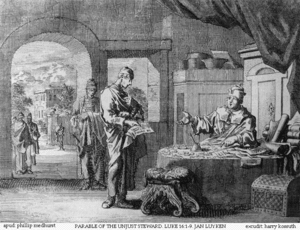Luke 16
[2] The book containing this chapter is anonymous, but early Christian tradition uniformly affirmed that Luke the Evangelist composed this Gospel as well as the Acts of the Apostles.
Verses 1 to 8a tell a story about a steward who is about to be dismissed, but "curries favor" with his master's debtors by remitting some of their debts.
[7] "Unrighteous mammon" (Greek: του μαμωνα της αδικιας, tou mamōna tēs adikias) refers to wealth, or "money" in paraphrases such as that of J.
Johann Bengel suggests that along with their "covetous" nature, "they fancied themselves to be accomplished in (furnished with) such prudence as to be able admirably to combine the service of God and that of mammon", whereas the teaching of Jesus required "singleness of heart", a quality they also despised.
[18] Along with the parables of the Ten Virgins, Prodigal Son, and Good Samaritan, it was one of the most frequently illustrated teachings in medieval art,[22] perhaps because of its vivid account of an afterlife.


Top panel: Lazarus at the rich man's door
Middle panel: Lazarus' soul is carried to Paradise by two angels; Lazarus in Abraham's bosom
Bottom panel: Dives' soul is carried off by two devils to Hell; Dives is tortured in Hades